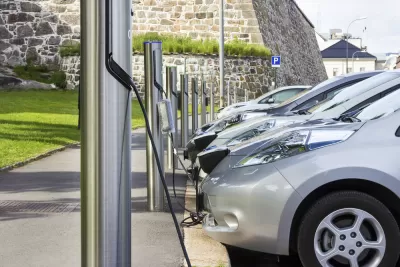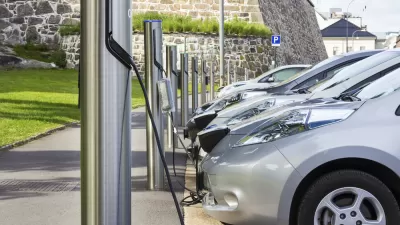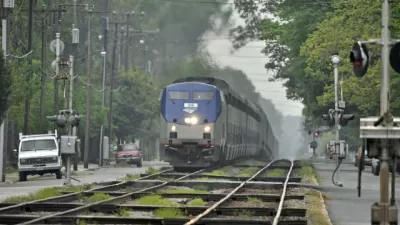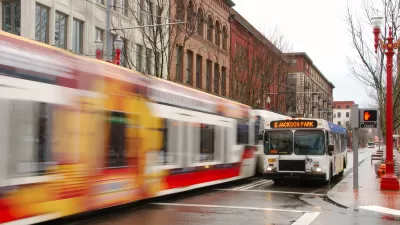Funding the electrification of personal vehicles won't move the needle on climate change nearly as much as investing in infrastructure that lets people get out of their cars, mode shift advocates argue.

The Bipartisan Infrastructure Bill includes $15 billion in funding for electrification of vehicles, down from the "whopping $100 billion in consumer incentives (and $15 billion more for EV fueling infrastructure)" proposed in President Biden's American Jobs Plan. But as Kea Wilson writes, transit and biking advocates say the bill remains too fixated on EVs as a solution for climate change. "Biden’s over-focus on electric vehicles as a silver-bullet climate solution will come at a steep cost to the modes that scientists agree hold the real key to saving the planet without accelerating the national traffic violence crisis: transit, biking and walking."
Electrifying personal vehicles, says John Stout of the U.S. Public Interest Research Group, is "only part of the solution to our transportation woes. In addition to garnering the federal government’s support for a faster transition to EVs … we need to make it easier for people to drive less." Beth Osborne, director of Transportation for America, said in a statement, "[i]n its current state, this deal fails to accomplish the administration’s goal of reducing emissions, preserving both the status quo of easy money to build new highways (while neglecting basic repair needs) and the existing, complex hurdles to build transit."
FULL STORY: Biden’s Climate Vision is Too Focused on EVs — Again

Maui's Vacation Rental Debate Turns Ugly
Verbal attacks, misinformation campaigns and fistfights plague a high-stakes debate to convert thousands of vacation rentals into long-term housing.

Planetizen Federal Action Tracker
A weekly monitor of how Trump’s orders and actions are impacting planners and planning in America.

San Francisco Suspends Traffic Calming Amidst Record Deaths
Citing “a challenging fiscal landscape,” the city will cease the program on the heels of 42 traffic deaths, including 24 pedestrians.

Defunct Pittsburgh Power Plant to Become Residential Tower
A decommissioned steam heat plant will be redeveloped into almost 100 affordable housing units.

Trump Prompts Restructuring of Transportation Research Board in “Unprecedented Overreach”
The TRB has eliminated more than half of its committees including those focused on climate, equity, and cities.

Amtrak Rolls Out New Orleans to Alabama “Mardi Gras” Train
The new service will operate morning and evening departures between Mobile and New Orleans.
Urban Design for Planners 1: Software Tools
This six-course series explores essential urban design concepts using open source software and equips planners with the tools they need to participate fully in the urban design process.
Planning for Universal Design
Learn the tools for implementing Universal Design in planning regulations.
Heyer Gruel & Associates PA
JM Goldson LLC
Custer County Colorado
City of Camden Redevelopment Agency
City of Astoria
Transportation Research & Education Center (TREC) at Portland State University
Jefferson Parish Government
Camden Redevelopment Agency
City of Claremont





























